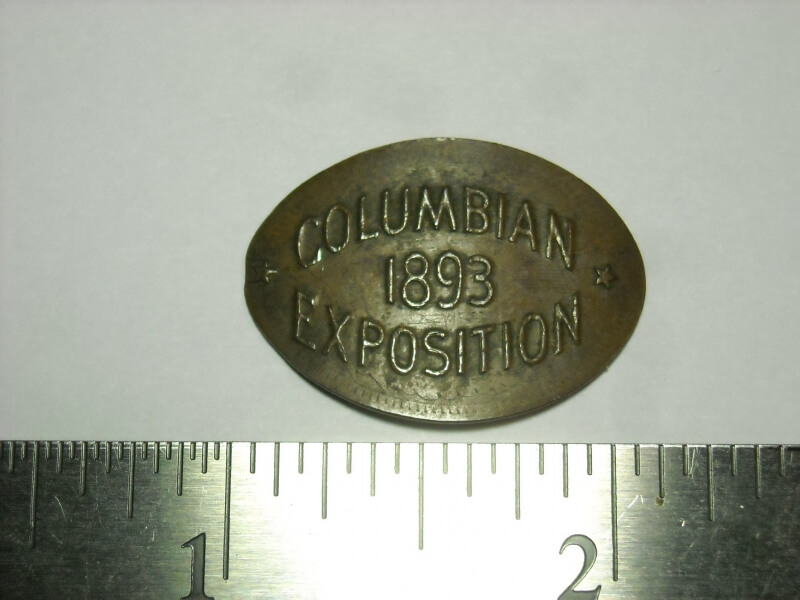The Innovation of the First Elongated Souvenir Coins at the 1893 Columbian Exposition in Chicago
Today’s modern Elongated cents
(also known as pressed pennies, squashed cents, rolled cents and many other
names), can trace their history to an innovation at the 1893 World’s Columbian
Exposition held in Chicago.
The first recorded documentation of
coins (both U.S. and World) being “rolled” with a press with a design on the
roller to produce a new type of souvenir, was done at the 1893 World’s
Columbian Exposition (Photo 1 below). Over two
dozen Elongated design types are known to have been “rolled” at the 1893
World’s Columbian Exposition.
As stated
by Angelo Rosato in his book Encyclopedia
of the Modern Elongated (p. 2):
·
“It was at this spectacular event, in
1893, that United States coinage was elongated in the process of rolling. For the first time ever, publicly, for those
visitors in the Electricity Building at the Columbian World’s Fair Exposition,
the [sic] American coins were intentionally mutilated for the purpose of
souvenir specimens commemorating the celebration; an event which in effect
opened a whole new facet in numismatics history. And, as a matter of fact, these rolled-out
keepsakes were the first ever to be given full recognition and recorded in a
numismatic bulletin. In 1894, appearing in the American Journal of Numismatics,
Vol. 28, pages 65 and 67 (Jan., April 1894)…”
The Elongated coins shown in this
exhibit are from the 1893 World’s Columbian Exposition, the earliest documented
Elongated coins. The innovation of the
unknown entrepreneur that had the idea to take an existing rolling machine,
machine a simple design (COLUMBIAN 1893 EXPOSITION) on a roller, and charge a
nominal amount to create a new type of collectable souvenir, is genius.
A whole new numismatic collecting
field was created, and is growing even today.
You can find Elongated Rolling Machines at most tourist attractions
(museums, zoos, theme parks, etc.) not only in the U.S., but in other counties
around the world.
The Photo 2 below is of Mr. Ray
Dillard, a member of The Elongated Collectors, operating a simple rolling
machine with one design to produce an Elongated cent. This rolling machine is similar to the type
used at the 1893 World’s Columbian Exposition.
At the 1893 World’s Columbian
Exposition, it was documented that the machine operator collected a small fee
(mostly likely 5¢ – 10¢) and the coin the person wanted to be “rolled”. Since the machine operator could manually
adjust the rollers, they could do most thicknesses of coins as long as the coin
would fit the machine and the machine operator could turn the crank (Photo 3 below).

1893 Columbian Exposition Elongate Rolled on an 1893 Indian Head Cent (Photo by: Richard Jozefiak)
The most common coin used to
be “rolled” was the cent; this is based on the number of surviving Elongated
coins from the 1893 World’s Columbian Exposition.

Mr. Ray Dillard, an operator of an early type of hand- operated rolling machine that produces Elongates. (Photo by: Richard Jozefiak)

Examples of 1893 Columbian Exposition Elongated Coins- (Ex 2014 Ray Dillard Collection, Ex O. Wilson Morgan Collection) (Photo by: Richard Jozefiak)
